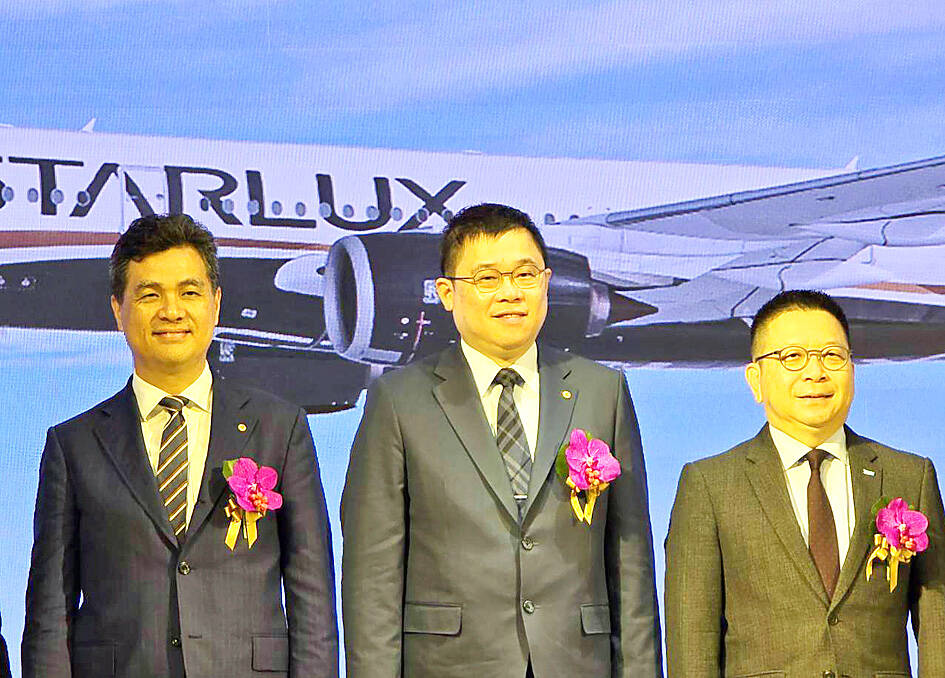Shares of Starlux Airlines Co (星宇航空) surged more than 53 percent on its debut on the Taiwan stock exchange yesterday.
Starlux shares closed up 53.75 percent at NT$30.75 from its initial public offering price of NT$20 after retreating in late trading from a 60 percent rise.
China Airlines Ltd (CAL, 中華航空) rose 0.90 percent to close at NT$22.35, while EVA Airways Corp (長榮航空) gained 0.40 percent to close at NT$37.70.

Photo: CNA
In Taiwan, a newly listed stock is allowed to go beyond the 10 percent maximum increase or decline in its first five trading sessions.
At the listing ceremony, Starlux chairman Chang Kuo-wei (張國煒) said the carrier has entered its second phase of expansion since last month, setting its sights on destinations in Europe.
Starlux is planning to add three destinations next year, covering long-haul and short-haul routes, Chang said.
The airline was looking to increase flights to Los Angeles and Seattle, and had also set its sights on other US destinations such as New York, Dallas and Houston, he said last month.
The carrier is expected to be operating 31 routes to 27 destinations worldwide by the end of this year.
Starlux has a fleet of 24 aircraft, which would increase to 26 after the carrier takes delivery of two A350-900s before the end of this year.
Chang said that the fleet is expected grow to more than 50 planes by 2026, focusing on aircraft geared for the long-haul market.
The next step would be to add more flights out of Taichung and Kaohsiung, he said, adding that the firm would likely add A320 aircraft, boosting the fleet to more than 70, to meet those needs.
Starlux was upbeat about the transit market through Taiwan for passenger and cargo business, he said, highlighting anticipated growth in demand for cargo services to destinations in Southeast Asia and the US.
The company is keen to enter the cargo business and early this year signed an agreement to buy five A350 cargo planes with an option for an additional five, he said.
Starlux was profitable for the first time last year, posting net profit of NT$149 million (US$4.65 million), or earnings per share (EPS) of NT$0.08.
In this first half of this year, its EPS was NT$0.39, up from NT$0.18 in the same period last year.
The airline reported consolidated sales of NT$9.60 billion last quarter, up 58 percent from a year earlier and the highest for any quarter in the company’s history.
To broaden its international reach, Starlux has said it would apply to join the Oneworld global airline alliance before the end of next year.
The Oneworld Alliance has 13 members, including American Airlines, British Airways, Cathay Pacific and Qantas.
It serves more than 900 destinations in 170 territories.

NO BREAKTHROUGH? More substantial ‘deliverables,’ such as tariff reductions, would likely be saved for a meeting between Trump and Xi later this year, a trade expert said China launched two probes targeting the US semiconductor sector on Saturday ahead of talks between the two nations in Spain this week on trade, national security and the ownership of social media platform TikTok. China’s Ministry of Commerce announced an anti-dumping investigation into certain analog integrated circuits (ICs) imported from the US. The investigation is to target some commodity interface ICs and gate driver ICs, which are commonly made by US companies such as Texas Instruments Inc and ON Semiconductor Corp. The ministry also announced an anti-discrimination probe into US measures against China’s chip sector. US measures such as export curbs and tariffs

The US on Friday penalized two Chinese firms that acquired US chipmaking equipment for China’s top chipmaker, Semiconductor Manufacturing International Corp (SMIC, 中芯國際), including them among 32 entities that were added to the US Department of Commerce’s restricted trade list, a US government posting showed. Twenty-three of the 32 are in China. GMC Semiconductor Technology (Wuxi) Co (吉姆西半導體科技) and Jicun Semiconductor Technology (Shanghai) Co (吉存半導體科技) were placed on the list, formally known as the Entity List, for acquiring equipment for SMIC Northern Integrated Circuit Manufacturing (Beijing) Corp (中芯北方積體電路) and Semiconductor Manufacturing International (Beijing) Corp (中芯北京), the US Federal Register posting said. The

India’s ban of online money-based games could drive addicts to unregulated apps and offshore platforms that pose new financial and social risks, fantasy-sports gaming experts say. Indian Prime Minister Narendra Modi’s government banned real-money online games late last month, citing financial losses and addiction, leading to a shutdown of many apps offering paid fantasy cricket, rummy and poker games. “Many will move to offshore platforms, because of the addictive nature — they will find alternate means to get that dopamine hit,” said Viren Hemrajani, a Mumbai-based fantasy cricket analyst. “It [also] leads to fraud and scams, because everything is now

MORTGAGE WORRIES: About 34% of respondents to a survey said they would approach multiple lenders to pay for a home, while 29.2% said they would ask family for help New housing projects in Taiwan’s six special municipalities, as well as Hsinchu city and county, are projected to total NT$710.65 billion (US$23.61 billion) in the upcoming fall sales season, a record 30 percent decrease from a year earlier, as tighter mortgage rules prompt developers to pull back, property listing platform 591.com (591新建案) said yesterday. The number of projects has also fallen to 312, a more than 20 percent decrease year-on-year, underscoring weakening sentiment and momentum amid lingering policy and financing headwinds. New Taipei City and Taoyuan bucked the downturn in project value, while Taipei, Hsinchu city and county, Taichung, Tainan and Kaohsiung